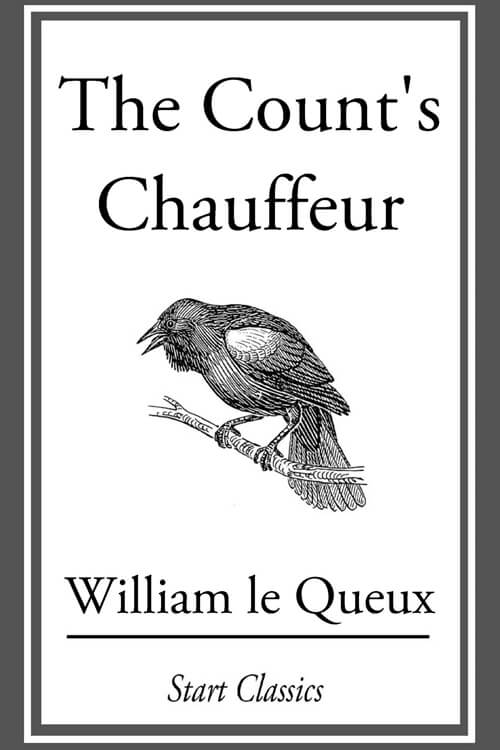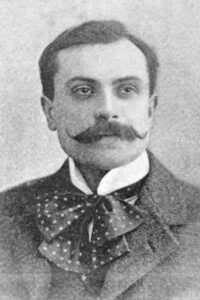
The Count’s Chauffeur
In Paris, Rome, Florence, Berlin, Vienna—over half the face of Europe, from the Pyrenees to the Russian frontier—I am now known as “The Count’s Chauffeur.”
An Englishman, as my name George Ewart denotes, I am of cosmopolitan birth and education, my early youth having been spent on the Continent, where my father was an agent for a London firm.
When I was fourteen, my father, having prospered, came to London, and established himself as an agent in Wood Street, City, representing a great firm of silk manufacturers in Lyons.
At twenty I tried City life, but an office with a high stool, a dusty ledger, and sandwich lunches, had no attraction for me. I had always had a turn for mechanics but was never allowed to adopt engineering as a profession, my father’s one idea being that I should follow in his footsteps—a delusive hope entertained by many a fond parent.
Six months of office life sufficed me. One day I went home to Teddington and refused to return to Wood Street. This resulted in an open quarrel between my father and myself, with the result that a week later I was on my way to Canada. In a year I was back again, and, after some months of semi-starvation in London, I managed to obtain a job in a motor factory. I was then entirely in my element. During two years I learned the mechanism of the various petrol-driven cars until I became classed as an expert driver and engineer.
At the place I was employed there was manufactured one of the best and most expensive makes of English car, and, being at length placed on the testing staff, it was my duty to take out each new chassis for its trial run before being delivered to a customer.
Upon my certificate, each chassis was declared in perfect running order and was then handed over to the body-makers indicated by the purchaser.
Being an expert driver, my firm sent me to drive in the Tourist Trophy races in the Isle of Man, and I likewise did the Ardennes Circuit and came in fourth in the Brescia race for the Florio Cup, my successes, of course, adding glory and advertisement to the car I drove.
Racing, however, aroused within me, as it does in every motorist, an ardent desire to travel long distances. The testing of those chassis in Regent’s Park, and an occasional run with some wealthy customer out on the Great North Road or the Bath or Brighton roads, became too quiet a life for me. I was now seized by a desire to tour and see Europe. True, in my capacity as a tester, I met all classes of men. In the seat beside me sat Cabinet Ministers, Dukes, Indian Rajahs, Members of Parliament, and merchant princes, customers, or prospective purchasers, all of whom chatted with me, mostly displaying their ignorance of the first principles of mechanics. It was all pleasant enough—a merry life and good pay. Yet I hated London, and the height of my ambition was a good car to drive abroad.
After some months of waiting, the opportunity came, and I seized it.
By appointment, at the Royal Automobile Club one grey December morning, I met Count Bindo di Ferraris, a young Italian aristocrat, whose aspect, however, was the reverse of that of a Southerner. About thirty, he was tall, lithe, and well-dressed in a dark-brown lounge suit. His complexion, his chestnut hair, his erect, rather soldierly bearing, his clean-shaven face, and his open countenance gave him every appearance of an English gentleman. Indeed, I at first took him for an Englishman, for he spoke English so perfectly.
Read or download Book
William Le Queux
William Tufnell Le Queux (2 July 1864 – 13 October 1927) was an Anglo-French journalist and writer. He was also a diplomat (honorary consul for San Marino), a traveler (in Europe, the Balkans, and North Africa), a flying buff who officiated at the first British air meeting at Doncaster in 1909, and a wireless pioneer who broadcast music from his station long before radio was generally available; his claims regarding his abilities and exploits, however, were usually exaggerated. His best-known works are the anti-French and anti-Russian invasion fantasy The Great War in England in 1897 (1894) and the anti-German invasion fantasy The Invasion of 1910 (1906), the latter becoming a bestseller.
Early life
Le Queux was born in London. His father was a French draper’s assistant and his mother was English. He was educated in Europe and studied art under Ignazio (or Ignace) Spiridon in Paris. He carried out a foot tour of Europe as a young man before supporting himself by writing for French newspapers. In the late 1880s, he returned to London where he edited the magazines Gossip and Piccadilly before joining the staff of The Globe as a parliamentary reporter in 1891. In 1893 he abandoned journalism to concentrate on writing and travelling. His partial French ancestry did not prevent him from depicting France and the French as the villains in works of the 1890s, though later he assigned this role to Germany.
Career
Le Queux mainly wrote in the genres of Romance, mystery, thriller, and espionage, particularly in the years leading up to World War I, when his partnership with British publishing magnate Lord Northcliffe led to the serialized publication and intensive publicizing (including actors dressed as German soldiers walking along Regent Street) of pulp-fiction spy stories and invasion literature such as The Invasion of 1910, The Poisoned Bullet, and Spies of the Kaiser. These works were a common phenomenon in pre-World War I Europe, involving fictionalized stories of possible invasion or infiltration by foreign powers; Le Queux’s specialty, much appreciated by Northcliffe, was the German invasion of Britain. He was also the original editor of Lord Northcliffe’s War of the Nations.






